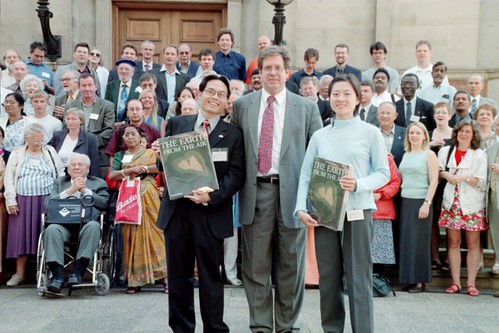Reading this post on BoingBoing about the dress code for a high end boutique reminded me of something my old boss Bill Pace at the Coalition for the International Criminal Court used say. As an up-and-coming international NGO at the United Nations, we had a pretty steady stream of new staff and interns at the CICC. And Bill would frequently have to orient the new folks to how we worked. Here's the gist of what he used to say about dressing up for the UN:
As a pretty laid back, casual guy, I really hate to ask you all to do this. But I have to. I'm going to have to ask all of you to dress as professional as you can when we are in meetings with diplomats at the United Nations. For the guys, that means a suit and tie, dress shoes, clean-shaven, etc. For the ladies, dress suits, nice blouses and skirts at a modest length, dress shoes. No sneakers, no flip-flops, no jeans.
It's not because I want to be the fashion police. It's because we are in the territory of the enemy, we are not generally wanted there. We are at best tolerated, at worst distrusted and misunderstood. And so we want to do our best to fit in.
We want to be judged for the quality of our work not our appearance. So don't make your clothes the focus, make it our mission: creating the world's first global human rights court. So look sharp, and be sharp.
Years later, I think about Bill's words when I have to put on a grey suit and boring tie to meet up with some government or corporate types. It's not about becoming a mindless salary-man. It's about not letting your appearance distract from the impact you are trying to have.
What is a "dress code"? It's a way of controlling what your attire is communicating about you. If you are lucky enough to work for a company where you don't have a stated dress policy, you still can have your own personal "dress code." That is, you can be intentional about what you are non-verballing signalling to others around you by your appearance.
Some questions to ask yourself:
- What is my personal style and how is that reflected in what I am wearing?
- What will someone just meeting me notice about my appearance first?
- Am I comfortable in what I am wearing, or is it a costume?
- Will this article of clothing draw attention to me in the way that I want?
Women, in general, are conditioned to be better at answering these questions than men, even in a metrosexual culture. But I also see a lot of women who look uncomfortable in what they are wearing or look outrageous when their personality is conservative, or vice-versa.
I must say that I'm still getting used to the more casual San Francisco-style, where showing up at a party in an ironic Threadless t-shirt and jeans is the norm, and "Casual Friday" is everyday at many workplaces. But even here, I don't think it ever hurts to "Look sharp and be sharp."
